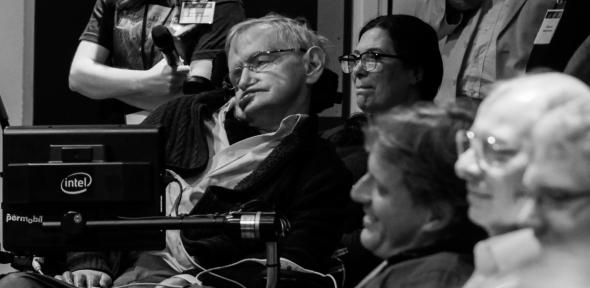
Professor Thomas Hertog was Stephen Hawking's PhD student, and subsequently one of Hawking's closest collaborators. In this fascinating talk, given at the 2023 Cambridge Festival, he reflects on working with Hawking, the theory that they developed together, and what it can tell us about the origins of the Universe.
"25 years ago Stephen Hawking invited me to his office, here on Silver Street, to discuss the Big Bang. That was his idea of a job interview," begins Thomas Hertog.
In the Department of Applied Mathematics and Theoretical Physics, that first job interview evolved into an intense collaboration, with Hawking and Hertog working on developing a new theory of the cosmos. "Here was a physicist guided in his research by the big questions humans have always asked," says Hertog in the talk below. "And in physics and in science, once in a while the big questions come to the forefront, and you know you're learning something."
Hawking’s most daring project was quantum cosmology and his No Boundary Proposal for the Universe. This describes what happened at the Big Bang, which Einstein’s theory of relativity cannot describe. Developed in the 1980s with Professor Jim Hartle (University of California), the No Boundary Proposal says that when we go back toward the beginning of our Universe, space and time become fuzzy and 'cap off', somewhat similar to the way the direction North ceases to be well defined at the North Pole.
In 2000 Hawking, Hartle and Thomas Hertog started exploring what predictive powers the No Boundary Proposal can bring to cosmology, calculating what kinds of universe could emerge from the Big Bang according to the proposal, and the observational consequences. They argued that the No Boundary Proposal predicts a universe that begins with a period of inflation (exponential expansion). The universe would start almost completely smooth, apart from small quantum irregularities that would be expanded by inflation to give rise to all the structure we see in the Universe today. Some of these predictions are now being tested, others, such as the production of primordial gravitational waves during inflation, can be tested by future observations.
In the final years of his life, Hawking and Hertog started to study eternal inflation from a different view point, based on string theory and a concept called holography. The fascinating possibilities this opens up are explored in Hertog's talk.
About the speaker
Thomas Hertog is Professor of Theoretical Physics at KU Leuven in Belgium. After studying Part III at the University of Cambridge, he completed his PhD in the Department of Applied Mathematics and Theoretical Physics under the supervision of Professor Stephen Hawking. He is a member of the external Scientific Advisory Committee for the Stephen Hawking Centre for Theoretical Cosmology, based in DAMTP. Thomas Hertog's book On the Origin of Time was published in 2023.
Image: Professor Thomas Hertog (R) and Professor Stephen Hawking among colleagues during a talk at Stephen Hawking's 75th Birthday Symposium, Centre for Mathematical Sciences, Cambridge. Photo: Dr Tobias Baldauf.
You can find out more about mathematics events taking place for the 2024 Cambridge Festival here.
